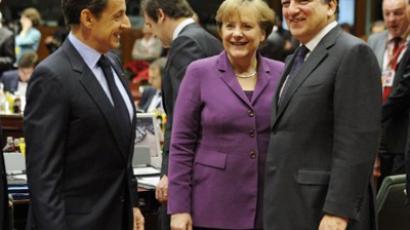Euro woes: No joy for 10-year-old currency
2012 marks 10 years since Europeans first held euro notes and coins in their hands. But prospects are grim for Europe's single currency in the New Year, as the region's leaders warn of tough sacrifices in this "most severe test in decades".
With recession looming, the sense of optimism that greeted the united currency at its inception seems to have evaporated.The birth of an ambitious project – a common currency – was celebrated with no less than a big bang. “The euro is the beginning of a stronger European Union. We shall be the best in the world, the best in the world!” promised Romano Prodi, the former European Commission president back in 2002. Yet 10 years down the road, the euro is not in the best of shape: a spiraling sovereign debt crisis, credit downgrades, rising interest rates, tens of millions unemployed, budget cuts, and violent protests.“The euro is undergoing the worst crisis it has ever been in and obviously the founders of the euro did not hope that this would happen,” economist Janis Emmanouilidis explained to RT. For what began as a step towards a united Europe, has become a race against time, with EU leaders scrambling to keep it together.Eurosceptics have long argued that the euro was flawed from the start, pursuing a political dream above all else. They say lumping together polar opposite economies like that of Greece and Germany into a monetary union could never work.“All economic rationality has been thrown out of the window in the pursuit of this goal and we are now reaping the consequences of that,” states economic analyst Shane Firth.Couple that with internal squabbles and deadlocks.“There has to be a sign from somewhere that some economic entity that is credible is going to back every eurozone bond and there are only two or three entities that can do that,” explains Peter Spiegel, the chief of The Financial Times’ Brussels bureau. “One is the European Central Bank, the other is basically the German government and neither of them right now are willing to do it”. There is an exhibit in Brussels which shows the journey of the European Union and the creation of the single currency. With documented events in history that contributed to the idea, justified it, and explain why it would have been appealing to decision makers at the time – so much so that the cracks in the fundamentals were overlooked or ignored. Which brings us to the point – 10 years after the creation of the euro, its appeal has waned. And despite last-ditch efforts to save it, its future still remains uncertain.In the spirit of the New Year, RT’s Tesa Arcilla asked for some predictions.“One can be sure of is that this crisis is going to be a long and bumpy road. However if you would ask me, do you think that the euro would still exist in 10 years’ time, my answer will be yes,” believes economist Janis Emmanouilidis. “They can’t bring themselves to admit that it was a mistake. So I’m afraid we risk the very thing they purport to fear which is a disorderly breakup of the euro caused by having tried to keep it together for too long,” argues Daniel Hannen, member of the European Parliament from the UK Conservative Party“Downgrades almost certainly. I think you’ll see a French downgrade,” predicts Peter Spiegel of The Financial Times. “I still think this is still solvable if the political will is shown in certain member states to allow for what is called solidarity. And if not, if not we are in for a huge, huge recession in Europe.”“It’s certainly my prediction that at least Greece will leave the euro in the next year. And what happens beyond that is unpredictable,” says economic analyst Shane FirthEuro watchers may have diverging views on the single currency’s future. But it seems whichever way the euro goes, it will not be painless.














